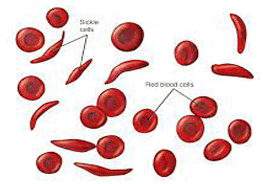Treatment of Sickle Cell Anemia in Delhi
Sickle cell anemia is an inherited form of blood disorder. Sickle cell anemia changes your red blood cells from round, flexible discs to stiff, sticky sickled cells. Sickled cells prevent red blood cells from doing their job of transporting oxygen throughout the body. Sickled cells also have a shorter lifespan than normal red blood cells leading breakdown of red cells and anemia.
People with sickle cell anemia continue to face potentially fatal medical complications.

What is the cause of sickle cell anemia?
According to Best doctor for treatment of Sickle cell anemia in Delhi People who have sickle cell anemia get it from their biological parents. The gene that aids in the production of normal red blood cells mutates or changes in sickle cell anemia. People with sickle cell anemia inherit the mutated hemoglobin protein gene from both biological parents. People with sickle cell trait inherit the mutated gene from one biological parent.
Symptoms
Symptoms of sickle cell anemia usually appear as early as six months of age. They vary from person to person and change over time. Among the signs and symptoms are:
- Anemia. Sickle cells easily disintegrate and die. Red blood cells have a lifespan of about 120 days before they need to be replaced. However, sickle cells typically die within 10 to 20 days, resulting in a red blood cell shortage (anemia). The body cannot receive enough oxygen if there are insufficient red blood cells, resulting in fatigue.
- Painful episodes. A frequent occurrence of pain episodes is a major symptom of sickle cell anemia. Due its abnormal shape (sickle-shaped) these red blood cells obstruct the blood flow, it causes pain in chest, abdomen, and joints via tiny blood vessels. It leads to repeated painful episodes sometimes requiring hospital admissions.
- The pain intensity varies and can last from a few hours to a few days. Some people only experience a few pain episodes each year. Others have dozens or more per year. In the event of a severe pain crisis, a hospital stay is required.
- In some adolescents and adults with sickle cell anemia, chronic pain can result in bone and joint damage.
- Hand and foot swelling. Swollen hands and feet are caused by sickle-shaped red blood cells, which obstruct blood flow.
- Infections occur frequently. Sickle cells can cause damage to the spleen, making it more susceptible to infection. Vaccinations and antibiotics are commonly given to sickle cell anemia infants and children to prevent potentially fatal infections such as pneumonia.
- Puberty or delayed growth . A lack of healthy red blood cells can delay infant and child development and delay puberty in teenagers.
- Decreased blood flow and clogging of blood flow in the brain vessels can cause stroke like symptoms.
Risk factors
Both parents must carry the sickle cell gene for their child to be born with sickle cell anemia. People of African, Mediterranean, and Middle Eastern descent are the most commonly affected by sickle cell anemia in the United States. It is widespread among the tribal population in India. In India, the state of Chattissgarh, Odisha, Jharkhand, Madhya Pradesh, upper Assam has higher number of sickle cell anemia patients.
Prevention
Seeing a genetic counsellor before trying to conceive can help you understand your risk of having a child with sickle cell anemia if you carry the sickle cell trait. A genetic counsellor can also discuss the preventive measures, and reproductive options.
Diagnosis
A blood test called HPLC can detect the type of haemoglobin that causes sickle cell anemia. This blood test is part of routine test during pregnancy in most of the major centres in India. Its always advisable to do a HPLC tests of both of the partners before trying to conceive.
Treatment
The goal of sickle cell anemia treatment is to avoid pain episodes, relieve symptoms, and prevent complications. Medication and blood transfusions may be used as treatments. Hematopoietic stem cell transplantation, commonly known as bone marrow transplant is a curative treatment option for some children and teenagers who develop repeated painful episodes and acute stroke.
Medications
The use of medications on a daily basis reduces the frequency of
painful episodes and may reduce the need for blood transfusions and hospitalizations.
Some new targeted medications are now available to be used to treat sickle cell disease
in adults and children over the age of twelve. When taken orally, this medication can
reduce the risk of anemia while also improving blood flow throughout the body.
Medication for pain relief is used during sickle cell pain episodes, your doctor may
prescribe narcotics to help relieve pain and good hydration is very important to prevent
pain episodes.
For enquiries, bookings or support, call us at +91-96508 06846
Need help? Get a call back from our support team
Contact Us

